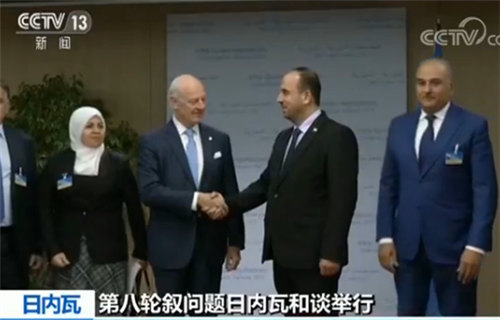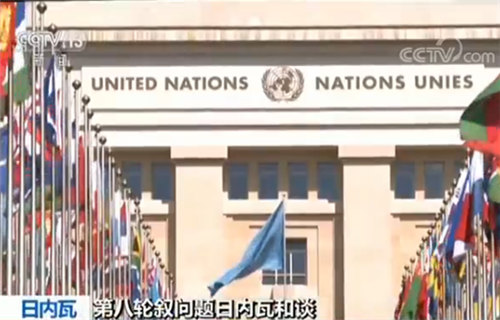Geneva peace talks "tug-of-war" Syrian government agreed to cease fire but differences are still serious!
Cctv newsThe eighth round of Geneva peace talks on Syria led by the United Nations was held in Geneva, Switzerland on 28th. On the same day that the peace talks began, the Syrian government decided to send a delegation to participate in the peace talks. It is expected that the Syrian government delegation will arrive in Geneva on the 29th.

On the 28th, the Syrian Foreign Ministry confirmed that after discussions with Russia, the Syrian government decided that the Syrian Permanent Representative to the United Nations Jaafari would lead a Syrian government delegation to Geneva to participate in this round of peace talks.
De Mistura, the UN Secretary-General’s Special Envoy for Syria, also said that he had received news that the Syrian government delegation had confirmed its participation in the peace talks.
Earlier, due to the serious differences between the Syrian government and the opposition on the issue of Syrian President Bashar al-Assad’s stay, the Syrian government delayed confirming its participation.

On the 27th, the Syrian opposition delegation that has arrived in Geneva said that the primary appeal of the opposition to participate in this round of peace talks is to ask Bashar to step down before the political process starts. Earlier, a senior official of the Syrian government said that the Syrian opposition’s "laying down arms" was a prerequisite for the success of the peace talks. Due to serious differences between the two sides, the Syrian government delegation postponed its trip to Geneva.
UN envoy meets Syrian opposition delegation
On the 28th, the eighth round of Geneva peace talks on Syria was officially opened. On the same day, UN Secretary-General’s Special Envoy for Syria, De Mistura, held talks with the Syrian opposition which formed a unified delegation in Geneva.
UN Secretary-General’s Special Envoy for Syria, De Mistura, said after meeting with Syrian opposition representatives on the 28th that the United Nations would propose for the first time that the Syrian government delegation and the Syrian opposition delegation should have a direct dialogue.
Whether the negotiating parties can "talk directly" is highly anticipated.
All along, the Geneva peace talks have been in the form of "indirect talks", that is, the UN Secretary-General’s Special Envoy for Syria acts as a mediator to communicate and communicate between the two sides. The representatives of the Syrian government and the opposition have not met directly. De Mistura said that it is not yet known whether the two sides will agree to direct dialogue, but the United Nations will put forward this proposal.
The Syrian opposition delegation formed a unified group for the first time.
De Mistura also said that there were many Syrian opposition factions that had participated in the Geneva peace talks many times before, and no unified delegation was formed. Before the opening of the peace talks, the Syrian opposition held a meeting to coordinate its position and formed a unified opposition delegation.
The Syrian government has agreed to cease fire in Dongguta area.
De Mistura also said that after communicating with the Russian side, the Syrian government has agreed to implement a ceasefire in the Dongguta area in the eastern suburb of Damascus, the Syrian capital. In the past few years, opposition forces have controlled the Dongguta area and frequently launched shelling into Syrian government-controlled areas, causing a large number of civilian casualties.
De Mistura, the UN Special Envoy for Syria, said that the new round of peace talks needs to have a new focus and be practical. Under the current circumstances, the Geneva peace talks have been fully prepared on how to promote the political settlement of the Syrian crisis.
De Mistura affirmed the role played by China.
On 28th, UN Secretary-General’s Special Envoy for Syria, De Mistura, met with China’s Special Envoy for Syria, Xie Xiaoyan. De Mistura fully affirmed China’s efforts and role in the Syrian issue.
The new round of peace talks still focuses on the "four baskets", namely, the formation of a national unity government, the revision of the constitution, the holding of general elections and anti-terrorism cooperation. Among them, amending the constitution and re-election will be the top priority. Xie Xiaoyan, the special envoy of the China administration on Syria, said that these two issues are crucial to promoting the political process on Syria.
Earlier in the day, De Mistura also held talks with representatives of the permanent members of the UN Security Council. De Mistura said that the talks with the representatives of the permanent members are very important. On the one hand, it can prepare the agenda of the talks, on the other hand, it can consolidate and strengthen the importance and authority of the Geneva peace talks, because the Geneva peace talks are the only political settlement process of the Syrian issue authorized by the Security Council.
The Syrian government is late and the opposition is early.
In the previous Geneva peace talks, the Syrian government delegation arrived at the venue in advance and waited for the arrival of the opposition. This time, the current round of peace talks started on the 28th, and the head of the Syrian opposition peace talks delegation Hariri arrived in Geneva on the 27th, while the Syrian government delegation will arrive in Geneva on the 29th. Experts believe that this is related to the current battlefield situation in Syria.
Geneva peace talks on Syria
Before this round of peace talks, the Geneva peace talks on Syria have been held for seven rounds, but due to the serious differences between the Syrian government and the opposition, many rounds of peace talks have not achieved substantive breakthroughs.
In December 2015, the United Nations Security Council unanimously adopted resolution 2254 aimed at promoting a political solution to the Syrian conflict, and decided to launch formal peace talks between Syrian factions led by the United Nations, which will be held at the Palais des Nations in Geneva.
According to this resolution, the current Geneva peace talks mainly include four topics: the establishment of a transitional government of national unity in Syria, the formulation of a new constitution, the holding of general elections and the joint efforts of all parties to fight terrorism. These four topics are also called "four baskets".
The differences between the parties are serious and it is difficult to achieve substantive progress.
Since January 2016, the parties to the Syrian issue have successively held several rounds of "Geneva Peace Talks on Syria". However, in the previous rounds of negotiations, the differences between the parties have been very serious. Even on the discussion order of the "four baskets", it is difficult for the Syrian government and the opposition delegation to reach an agreement. Moreover, the two sides can’t hold direct talks in the negotiations, but only indirect talks, which means that the United Nations needs to hold talks with the Syrian parties separately, and then shuttle messages between the parties. In this case, many rounds of negotiations failed to achieve substantive results on any topic.
Gradually but failed to break through the end of the seventh round of peace talks.
From July 10th to 14th, 2017, the seventh round of "Geneva Peace Talks on Syria" was held. This round of peace talks is still an indirect dialogue. After the seventh round of peace talks, UN Secretary-General’s Special Envoy for Syria, De Mistura, said that this round of peace talks has made some progress, but no substantive breakthrough has been made. On three topics except the establishment of a transitional government, the Syrian government and the opposition held many technical discussions to pave the way for substantive discussions; At the same time, a certain consensus has been reached on anti-terrorism and the prohibition of banned weapons. De Mistura said that the two sides are not far from substantive discussions.
Expert: US policy toward Syria is still unclear.
In addition to the great changes in the domestic situation in Syria, the involvement of external forces is another background that cannot be ignored. With extremist organizations losing ground in the Syrian battlefield, will the US policy toward Syria be adjusted?
Daniel Sevo, an American expert on Middle East issues, said that with the new round of Syrian peace talks, many American observers did not have high expectations for the outcome of the peace talks. In particular, the recent statement of US Secretary of Defense Matisse also shows that the US will not immediately withdraw its troops from Syria.
On November 13, US Defense Secretary Matisse said at the Pentagon that the US military will maintain a military presence in Syria for a long time to prevent the emergence of new extremist organizations. On November 24, US President Trump said in a telephone conversation with Turkish President Erdogan that the United States will no longer provide weapons and equipment to Kurdish armed forces in Syria. These actions also show that the United States is readjusting its Syrian policy.
However, experts said that from the current point of view, the US policy toward Syria is still unclear.
As the battle against extremist organizations in Syria is coming to an end, the United States is reassessing its policy toward Syria. Some observers said that no matter what adjustments the US makes, the US military will not leave Syria easily.